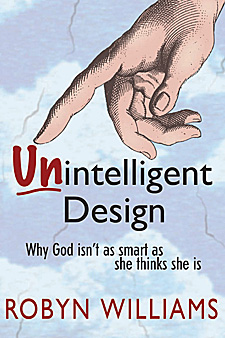This new book by Robyn Williams, science journalist, author, renowned ABC presenter and Fellow of the Australian Academy of Science, is advertised as one which "" wickedly and wittily debunks Creationism and Intelligent Design. Guaranteed to infuriate the religious right and amuse the rest of us."
Williams writes from a stated atheistic viewpoint, though he admits a "fondness for vicars' and is willing to acknowledge the contributions of various prominent Christian scientists and note their Christian commitment.
What particularly concerns him is that he sees Intelligent Design (ID) as a movement with heavy US political backing, which is trying to undermine science in western society. It should be appreciated, however, that the ID movement encompasses a considerable range of views, from people who acknowledge a very ancient universe and earth, including some who accept a substantial evolutionary component for development of life on earth, to those whose views tend towards Creationism.
Some people have suggested, I think with some justification, that antagonism within the ID movement to the Darwinian Theory of evolution has been exacerbated by the writings of a few scientists, in particular Richard Dawkins, who overstep the bounds of science and use the theory to advance their own atheistic view of the origin of life.
Williams' view is that Dawkins was reacting to an uncritical view on the part of Creationists towards what he saw as convincing evidence in favour of evolution.
As both a scientist and an evangelical Christian, I believe that God's work is evident in Creation. However, I, and most Christian scientists I know, would have sympathy with many of Williams' concerns about ID and especially about any possible incorporation of its teaching into science classes.
That is, we believe that science should be left to work out how God has created the universe and life on earth, while Christians concentrate on the why of God's creation - why God created us and the implications the answer to this question has for our relationship with Him and how He wants us to live.
We also are concerned with both the validity and danger of trying to bring a Christian bias into the way in which science is done. One example is the ID argument of "irreducible complexity' - a "God of the gaps' argument - that injects God into points in the genesis of life that are currently difficult to explain by science.
One danger of this approach is that God gets squeezed out of the picture as scientific advances fill in these gaps. In contrast, many of us believe that God primarily acts through so-called "natural scientific processes' and that advances in science, rather than diminishing God, only enhance our wonder of Him and the greatness of His creation.
 In Chapters 1-3 and 7 of Williams' book, there is much fascinating content, with interesting personal anecdotes and historical information, which should be helpful for those interested in this science-creation debate.
In Chapters 1-3 and 7 of Williams' book, there is much fascinating content, with interesting personal anecdotes and historical information, which should be helpful for those interested in this science-creation debate.
There are several chapters, notably Chapters 4-6, that seem to be written somewhat tongue-in-cheek and to be more specifically aimed to "" wickedly and wittily debunk[s] Creationism and Intelligent Design'. In these chapters, Williams questions the real world of pain, suffering and sin.
For example, while he can see how many of our physical problems could have arisen as a by-product of some evolutionary process, he has a major problem with an intelligent designer designing human beings as they are today, from scratch with the inherent problems that are part of the human condition.
Of course, the Bible readily acknowledges the fact that God has allowed pain and suffering, together with the freedom to choose to sin. Many of us find the idea of God using some natural evolutionary process as both compatible with scientific evidence and a ready explanation of the natural world we live in.
However, these and succeeding chapters raise controversial issues for a number of Christians and include at least one quotation and other material, which most Christians will find objectionable.
In Chapters 8-10, Williams discusses the influence of ID in Australia, his own personal experiences, the problem of evil in the world and his own experience of the religion of others. He sums up his concern about religious groups which try to force their opinions on others, by stating "" it is not a question of Williams versus God so much as Williams versus jackboots" (i.e., such groups). However, he sees value in the fulfilled lives of his religious friends, and pays tribute to "" the teachings of Jesus, minus the referrals upward to Dad" ".
Williams very fairly concludes the book, given his own atheistic beliefs and agenda, with a quote from a former colleague and good friend of mine, Jared Diamond, who said "" I accept the possibility of scientific explanations for almost every mystery of the natural world " but not for the greatest mystery of all" .'Why is there something, when there could have been nothing?' Religion will thrive as long as there are human beings alive to reflect the mystery of the First Cause."
While the book may upset or even offend many Christians, I think that it has useful contributions to the science-faith debate and offers many helpful insights from the perspective of a non-believer with a first-rate scientific mind. As Christians we have nothing to fear from a scientific search for the truth.
For a Christian viewpoint on many of these issues, I would strongly recommend three books: Coming to Peace with Science: Bridging the Worlds between Faith and Biology by Darrel R. Falk (IVPress), Random Designer: Created from Chaos to Connect with the Creator by Richard G. Colling (Browning Press) and Dawkins' God: Genes, Memes and the Meaning of Life by Alister McGrath (Blackwell Publishing).
Professor Peter Barry






















